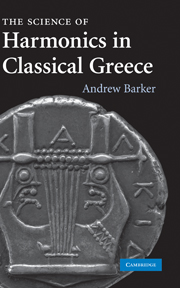Book contents
- Frontmatter
- Contents
- List of figures
- Preface
- Part I PRELIMINARIES
- Part II EMPIRICAL HARMONICS
- Part III MATHEMATICAL HARMONICS
- Chapter 10 Pythagorean harmonics in the fifth century: Philolaus
- Chapter 11 Developments in Pythagorean harmonics: Archytas
- Chapter 12 Plato
- Chapter 13 Aristotle on the harmonic sciences
- Chapter 14 Systematising mathematical harmonics: the Sectio canonis
- Chapter 15 Quantification under attack: Theophrastus' critique
- Postscript: the later centuries
- Bibliography
- Index of proper names
- General index
Chapter 10 - Pythagorean harmonics in the fifth century: Philolaus
Published online by Cambridge University Press: 22 September 2009
- Frontmatter
- Contents
- List of figures
- Preface
- Part I PRELIMINARIES
- Part II EMPIRICAL HARMONICS
- Part III MATHEMATICAL HARMONICS
- Chapter 10 Pythagorean harmonics in the fifth century: Philolaus
- Chapter 11 Developments in Pythagorean harmonics: Archytas
- Chapter 12 Plato
- Chapter 13 Aristotle on the harmonic sciences
- Chapter 14 Systematising mathematical harmonics: the Sectio canonis
- Chapter 15 Quantification under attack: Theophrastus' critique
- Postscript: the later centuries
- Bibliography
- Index of proper names
- General index
Summary
With the work of Aristoxenus this phase of the empirical tradition of harmonic theory has run its course. We now turn the clock back a hundred years or so to consider our earliest evidence about the mathematical form of the discipline, which originated with the Pythagoreans of the fifth century or conceivably with Pythagoras himself in the sixth. Evidence from later writers gives us a fair general picture of the approach to harmonics which they adopted and whose outlines I sketched in Chapter 1; I shall not repeat the programmatic points I made there. But on matters of detail and on the work of individual Pythagoreans of the early period the late sources are often unreliable. For the most part I follow Burkert in treating Aristotle as the most authoritative of our sources on the subject, together with a few fragments from the work of the late fifth-century Pythagorean Philolaus which most modern commentators take to be genuine. If they are, Philolaus is the only Pythagorean harmonic theorist before the fourth century of whose work we have solid and significant details.
The prize exhibit is a short passage from Philolaus' essay On Nature quoted by Nicomachus and Stobaeus. In modern editions it is sometimes printed as a continuation of Philolaus fragment 6, sometimes as a separate item; I shall refer to it as frag. 6a. It has been much discussed, but I have a serious purpose in re-examining it at some length here.
- Type
- Chapter
- Information
- The Science of Harmonics in Classical Greece , pp. 263 - 286Publisher: Cambridge University PressPrint publication year: 2007
- 1
- Cited by



